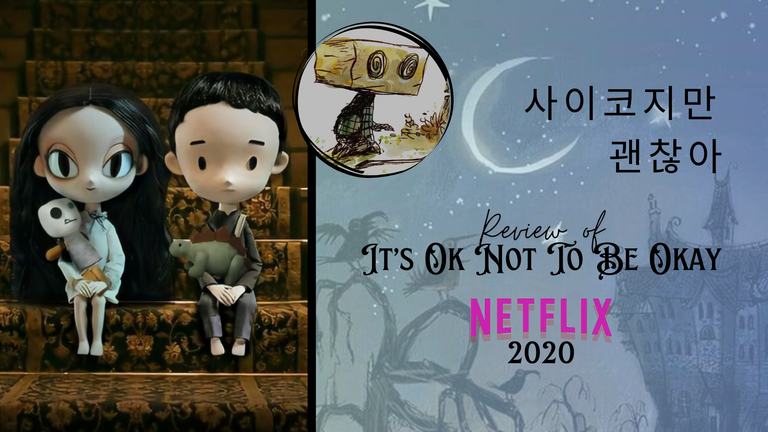REVIEW: IT'S OK NOT TO BE OK SPN/ENG

¡Hola comunidad! Una vez más vuelvo los domingos con la ligera actividad de bloggear. Espero que se encuentren sanos y salvos, disfrutando de las actividades que resulten de interés.
En esta ocasión, les entrego la reseña del último kdrama que decidí ver. Es conocido popularmente como "Está bien no estar bien" y la verdad es el tercer dorama que me ha atrapado al punto de llorar con sus escenas. Cosa que me sube un peldaño más en la cursilería.
![Click here to read in english]
Hello community! Once again I'm back on Sundays with the light activity of blogging. I hope you are safe and sound, enjoying the activities that are of interest.
On this occasion, I am giving you the review of the last kdrama that I decided to watch. It is popularly known as "It's Okay to Not Be Okay" and the truth is that it is the third drama that has caught me to the point of crying with its scenes. Which raises me one more step in the cheesiness.
So without further ado, let's get started!


Está Bien No Estar Bien desarrolla un romance entre Moon Kang Tae y Ko Moon Young, además de presentarnos la amistad e integración de Moon Sang Tae con ciertos momentos que rayan en comedia y reflexión, sobre todo, por las experiencias desalentadoras que, en cada historia personal, los obliga a ser adultos antes de tiempo.
Kang Tae se desarrolla como un joven enfermero con un gran gran historial laboral en centros psiquiátricos porque se ve en la necesidad de mudarse cada primavera. Una tradición que lleva junto a su hermano mayor Sang Tae, quién, debido a su espectro autista y experiencias traumáticas, piensa que las mariposas vendrán para asesinarlo.
En paralelo tenemos a Moon Young, una exitosa escritora de libros de terror infantil, cuya popularidad se debe más a los malabares de su manager para ocultar la terrible personalidad que raya en antisocial. Existen muchos misterios marketeados dado a que su madre fue una escritora muy famosa que desapareció misteriosamente y su padre, un arquitecto renombrado, se encuentra hospitalizado por demencia orgánica.
Prácticamente huérfanos desde la infancia dado las muertes y desapariciones de sus padres, este trío converge no solo por haber crecido en el mismo pueblo, sino que ahora, Sang Tae es uno de los mayores fans de Moon Young, y cuyo autógrafo
–en un comienzo– depende exclusivamente de su hermano.
![Click here to read in english] The story revolves around three protagonists whose lives are more intertwined than they – and we – could ever imagine. It's Okay to Not Be Okay develops a romance between Moon Kang Tae and Ko Moon Young, as well as introducing us to the friendship and integration of Moon Sang Tae with certain moments given by comedy and others by deeply reflections, especially due to the discouraging experiences that each personal story force them to have mature roles at a young age.
Kang Tae develops as a nurse with a long work history in psychiatric centers because he finds himself in the need to move every spring. A tradition that he carries on with his older brother Sang Tae, who, due to his autism spectrum and traumatic experiences, thinks that butterflies will come to kill him in that season.
In parallel we have Moon Young, a successful writer of children's horror books, whose popularity is due more to the juggling of her manager to hide the terrible personality that borders on antisocial. There are many marketed mysteries given to her success. For example, that her mother was a very famous writer who mysteriously disappeared and that her father, a renowned architect, is hospitalized for organic dementia.
Practically orphaned since childhood due to the deaths and disappearances of their parents, this trio converges not only because they grew up in the same town, but now, Sang Tae is one of Moon Young's biggest fans, and whose autograph
–initially– depends exclusively on his brother.


Debo hacer mención especial a la estructura de los capítulos, en el cual cada título presentado hacía referencia a un cuento infantil. La narrativa literaria da otra perspectiva de las enseñanzas que dejan los cuentos (indistintamente del rango de edad al que vayan dirigidos). Aunque, el género de terror en los cuentos de Moon young van dirigidos a su historia y a ciertas problemáticas de la sociedad coreana, también tiene otros temas que son muy generales. Por ejemplo, el impacto de la sobreprotección de los padres, el miedo a los propios sentimientos o la necesidad de afrontar el dolor para poder ser feliz.
Las animaciones de stop motion dan un toque único al drama y las transiciones de una escena a otra son admirables por que pasan desapercibidas y evitan, en su mayoria, el cambio de plano directo. La más memorable para mi es la transición de un cuadro que acaba siendo la ventana de un autobús y sigue el movimiento en la nueva escena.
Finalmente, existe cierto suspenso en la trama, liderado por las muertes que acontecieron muchos años atrás y que relaciona el pasado de los protagonistas. Algunos son predecibles, pero otros no tanto. Lo que te invita a estar muy atento a los detalles hasta de los personajes que pasan más desapercibidos.
![Click here to read in english] The title does justice to the story told and, although the presence of fiction is evident, it does not stand on the extreme that Asian dramas sometimes have.
I must make special mention of the structure of the chapters, in which each title presented referred to a children's tale. The literary narrative gives another perspective of the lessons left those tales (regardless of the age range to which they are directed). Although the horror genre in Moon young's stories are directed at her past and certain problems in Korean society, she also has other themes that are very general. For example, the impact of overprotection by parents, the fear of one's own feelings or the need to face pain in order to be happy.
The stop motion animations give a unique touch to the drama and the transitions from one scene to another are admirable because they go unnoticed and avoid, for the most part, the direct change of shot. The most memorable for me is the transition from a frame that ends up being the window of a bus and follows the movement in the new scene.
Finally, there is a certain suspense in the plot, led by the deaths that happened many years ago and that relate to the past of our protagonists. Some are predictable, but others not so much. Which invites you to pay close attention to the details of even the most inadvertent characters.



Le he otorgado 4,5 estrellas a este dorama porque, a pesar que me ha dejado maravillada con su repertorio escenico, la construcción de las escenas, las buenas actuaciones y los temas que toca, hay dos elementos que no fueron de mi agrado al 100%.
El principal es algo muy interiorizado en los kdramas y creo que simplemente yo no me acostumbro a ello por las diferencias culturales. Se trata del entorno acosador de las parejas romanticas, la necesidad de perseguir a alguien que explicitamente te está diciendo "dejame en paz, no quiero que te me acerques" o la romantización de un enemies to lovers con una convivencia forzada. En el caso de este drama, se ve como Moon Young incluso abusa de su poder adquisitivo para ir tras Kang Tae, cuando si fuera al revés el giro argumental, estoy casi segura que al muchacho lo hubieran tachado de acosador, misógino y demás.
Visualización de los términos psicológicos que no están bien descritos o simplemente la traducción hizo que se perdiera el sentido del término. La transferencia y contratransferencia no se da únicamente por intereses románticos, como lo explican en la serie y, si bien amé que se dieran el tiempo de relatar historias de pacientes y cómo una emoción simple puede llevar a cuadros más intensos de obsesión, disociación o depresión, la imágen del psiquiatra raya en poco profesionalismo y caricaturismo de la salud mental. Está genial que el médico encargado sea el comedy relief para mostrar un lado más humano, pero técnicamente lo que dibuja el personaje es que todas sus hipótesis eran hechas a base de puro chisme de pasillo y lo que podía ver a través de las cámaras de vigilancia.
🌱✨ Lo que se gana mi amor e incluso el hecho de que pueda volver a ver esta serie, es el retrato de aislamiento que le dan a los pacientes psiquiátricos. La visibilidad de las personas autistas y cuya actuación a través de Sang Tae es cercana a la realidad. Disfruté mucho las intervenciones de este personaje, cómo muestran sus obsesiones, su sensibilidad sensorial y que, muy diferente a lo que la gente suele pensar (dependiendo del grado de autismo, obviamente) cómo estas personas pueden interactuar con el mundo de manera independiente.
Al final cada personaje tuvo un desarrollo excepcional en el que se interpreta la palabra "Psique" como la metamorfosis por la que pasa una mariposa. Un final feliz que me agradó.
![Click here to read in english] I gave this drama 4.5 stars because, even though it left me amazed with its stage repertoire, the construction of the scenes, the good acting and the themes it touches on, there are two elements that I didn't like 100%.
◾️The main one is something that is very internalized in kdramas and I think I simply don't get used to it because of cultural differences. It's about the stalking environment of romantic couples, the need to chase someone who is explicitly telling you "leave me alone, I don't want you to get close to me" or the romanticization of an enemies to lovers with a forced cohabitation. In the case of this drama, you can see how Moon Young even abuses of her social and economic power to go after Kang Tae, when if the plot twist were the other way around, I'm almost sure that the boy would have been labeled a stalker, misogynist and so on.
◾️Viewing psychological terms that are not well described or simply the translation made the meaning of the term get lost. Transference and countertransference do not occur solely due to romantic interests, as explained in the series, and, while I loved that they took the time to tell stories of patients and how a simple emotion can lead to more intense pictures of obsession, dissociation or depression, the image of the psychiatrist borders on unprofessionalism and caricaturing of mental health. It's great that the doctor in charge is the comedy relief to show a more human side, but technically what the character draws is that all his hypotheses were made based on pure hallway gossip and what he could see through the surveillance cameras.
🌱✨ What earns my love and even the fact that I can watch this series again, is the portrait of isolation that they give to psychiatric patients. The visibility of autistic people and whose performance through Sang Tae is close to reality. I really enjoyed the interventions of this character, and his lines are the one's that made me cry; how they show their obsessions, their sensory sensitivity and how, very different from what people usually think (depending on the degree of autism, obviously), these people can interact with the world independently.
In the end, each character had an exceptional development in which the word "Psyche" is interpreted as the metamorphosis that a butterfly goes through. A happy ending that I liked.
Si has visto este drama estaré encantada de saber tus impresiones y lo que más te gustó entre sus capítulos. Yo sinceramente me reservé muchas cosas para evitar los spoilers.
If you have seen this drama, I would love to hear your impressions and what you liked most about the episodes. I honestly kept a lot of things to myself to avoid spoilers.
¡Gracias por leer!
Portadas, divisores e imágenes decorativas hechas en Canva
Fuente de imágenes sacadas de Pinterest
Cada imagen tiene su respectivo link
◽️◽️◽️
Thanks for reading!
Headings, dividers and images made with Canva
Image sources came from Pinterest
Each image has a link to its direct source


